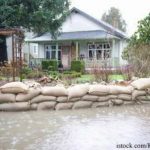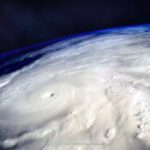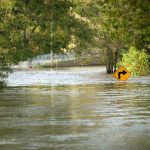With Hurricane Milton poised to hit Florida tomorrow, and people still cleaning up from Helene, there are some things you need to know about flood water. Drowning and building damage are not the only risks from floods. And this water is not just dirty. Flood waters contain chemicals, pollutants, bacteria, toxins, and viruses that can make you sick. And eating food or drinking water contaminated with these waters can be very dangerous. Even containers that you think are sealed are not impervious to flood water. Charlotte County issued a bulletin about these dangers. First, if you are under a boil water notice, use commercially boiled water for mixing baby food formula. Wash your hands with soap and either disinfected or boiled and cooled water, especially before preparing or … [Read more...]
FightBac Food Safety Tips For Hurricane Season
FightBac food safety tips for hurricane season have been released as Hurricane Ian approaches the southeastern United States, more specifically the west coast of Florida. Hurricanes can cause floods and power outages that can make food unsafe to eat and water unsafe to drink. These tips will help protect your family and pets from foodborne illness during and after a hurricane and other storms. It's important to prepare before the storm if you can. After you have finished securing your home and property, if you are riding out the storm, purchase and store food and water for your household in case the food supply is disrupted. Every person and pet should have at least one gallon of fresh potable water every day. For food, purchase non-perishable foods that have a long shelf life. … [Read more...]
How to Recover Food After Flooding From Hurricane Ida
Hurricane Ida has made landfall in Louisiana and catastrophic flooding has affected thousands. After a flood, there are things you can do to recover food after flooding, according to the FDA. Please note that only food that is packaged in completely waterproof containers is salvageable. For water, boiling and disinfecting with bleach will cost most, but not all, disease-causing pathogens. First, filter water through clean cloths, or let it settle and draw off the lear water. Boil the water for one minute, let it cool, and store in clean containers. Or add 1/8 teaspoon (8 drops) of unscented liquid chlorine bleach per gallon of water. Stir it and let stand for at least 30 minutes before you use it. Food containers that are waterproof including undamaged, commercially prepared … [Read more...]
Food Safety Tips During Hurricanes and Severe Storms
With the first named Atlantic hurricane approaching the U.S. mainland, the USDA is offering food safety tips during hurricanes and severe storms. The best thing to do is to be prepared before storms hit. And this advice applies to all Americans, not just those who live in hurricane-prone areas. First, make sure that you keep an appliance thermometer in your refrigerator and freezer. The freezer must be kept at 0°F or below, and the refrigerator between 33°F and 40°F to slow down most bacterial growth. Then, freeze containers of water for ice to help keep food frozen in the freezer or cold in the fridge or in coolers if the power goes out. Make more ice cubes too. You can also use this ice for drinking water if flooding occurs and you need a clean source of water. Freeze … [Read more...]
Do You Know How to Keep Food Safe In a Flood? Learn Tips and Tricks
There is severe flooding in Mississippi along the Mississippi River that has inundated the southern part of the states. And flood warnings and advisories have been issued from that state all the way up to Illinois. While the flood waters recede, officials are telling people about food safety. Do you know how to keep food safe in a flood? Any extreme weather can cause serious damage to a home. The power may go out; a home can be flooded with very dirty, contaminated water; and structural damage can occur. The key to keeping food safe during these events is to plan ahead. Before severe weather strikes, have a plan. Make sure you have thermometers in your refrigerator and freezer. The fridge should be below 40°F and the freezer below 0°F. The thermometers will help let you know if … [Read more...]
Food and Water Safety After a Flood From the CDC
If you have been affected by Hurricane Harvey, or if you are in the path of Hurricane Irma, the CDC has some information you should know about food safety after a disaster or flood. First of all, always throw away any food that may have come into contact with flood or storm water. Also discard perishable foods, and those with an unusual color, odor, or texture. When in doubt, throw it out. Don't use your fireplace for cooking until the chimney has been inspected for cracks. Sparks can escape into your attic through a spark and start a fire. Remember that perishable foods, including meat, poultry, fish, eggs, dairy products, and leftovers, must be discarded when the power has been off for four hours or more, even if they are refrigerated. Any food that still contains ice crystals … [Read more...]
Food and Water Safety Advice for Hurricane Harvey
The FDA is offering food safety and water safety advice for anyone affected by Hurricane Harvey in Texas. Food can be rendered unsafe by power outages and by contact with flood waters. If the power went out and perishable food has been above 40°F for more than 2 hours (more than 1 hour if the air temperature is at 90°F or above) it must be discarded. Cooking won't make this food safe, since bacteria can produce toxins that heat will not destroy. If the items stayed below 40°F and you are sure of this, cook them thoroughly to a safe minimum internal temperature before eating. Once power has been restored, check the temperature of appliance thermometers in the freezer and fridge. If the thermometers are 40°F or below, the food in the freezer can be refrozen. If you didn't have a … [Read more...]
USDA’s Food Safety Tips for Louisiana Flood Victims
The U.S. Department of Agriculture (USDA) has compiled some food safety tips for residents of Louisiana affected by the flood and those living in parishes currently under flood warning. Parishes under flood warning include: Livingston, West Baton Rouge, Northern St. James, Northern St. John, Pointe Coupee, Iberville, East Baton Rouge, and Ascension. Those already affected include: Baton Rouge, Zachary, Baker, Denham Springs, Gonzales, Donaldsonville, Melville, Oak Hills Place, Far northern portions of Reserve, Far Northern Portions of Laplace, St. Gabriel, Walker, Gramercy, Addis, Lutcher, and Brusly. After a flood, don't eat any food including raw fruits and vegetables, or cartons of milk or eggs, that may have come into contact with flood water. Throw away these foods and any … [Read more...]
Keep Food Safe After a Flood
There is terrible flooding in some parts of the United States. The FDA is offering advice on how to keep yourself safe from food poisoning after a flood. Flood water is usually filthy and filled with bacteria, viruses, and parasites. It can carry E. coli bacteria, Salmonella, Shigella, hepatitis A, and tetanus. If you have time before a flood or weather emergency, make sure you have appliance thermometers in your fridge or freezer. Freeze containers of water to help keep food cold in the fridge, freezer, or coolers. Have a supply of bottled water stored where it will be above the flood water. If flooding occurs, only use water from a safe source for drinking, preparing food, and for washing. Bottled water that has not been exposed to flood water is safest. If you don't have … [Read more...]
Food Safety After a Flood
Wondering about food safety after a flood? Here is what the U.S. Department of Agriculture’s (USDA) recommends: If you have advance notice of heavy rains that may produce floodwaters, buy jugs of water and shelf-stable foods that can feed your family for a few days and store them in an area flood waters are not likely to reach. Keep a jug of liquid bleach and a cooler in the same area. Find out where you can purchase dry ice. Buy appliance thermometers for your freezer and fridge. In the freezer, gather food together this will help it stay cold longer. If you lose power, a refrigerator will keep food cold for about four hours if you keep the door closed. A full freezer will keep food at a safe temperature for about 48 hours, a half-full freezer will keep food at a safe temperature … [Read more...]







